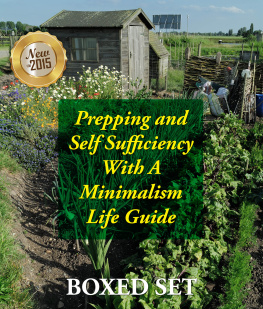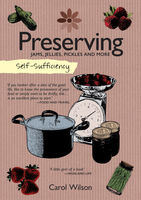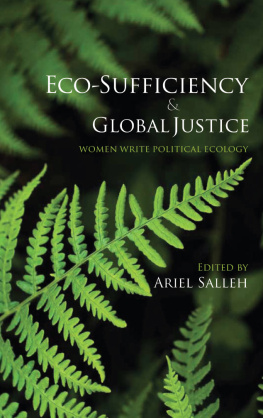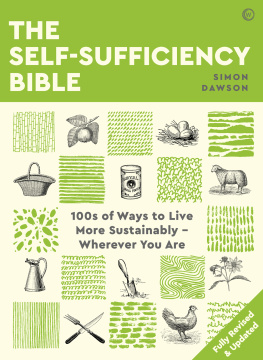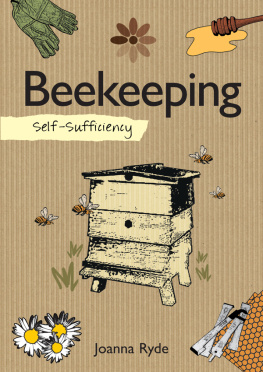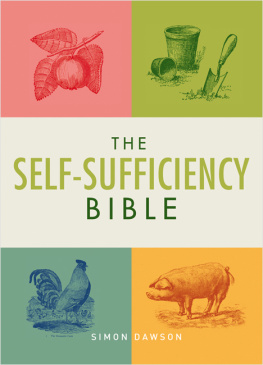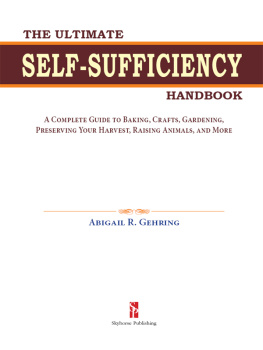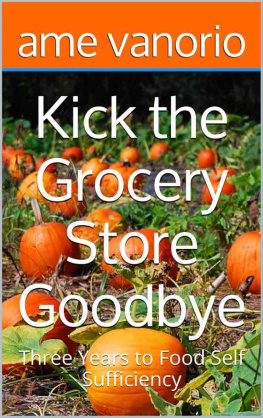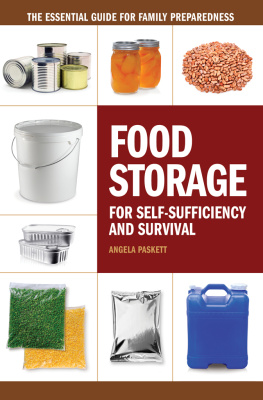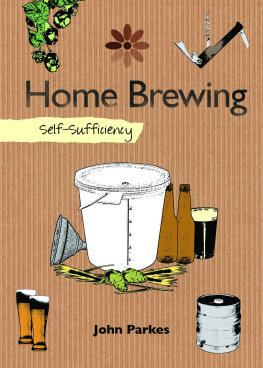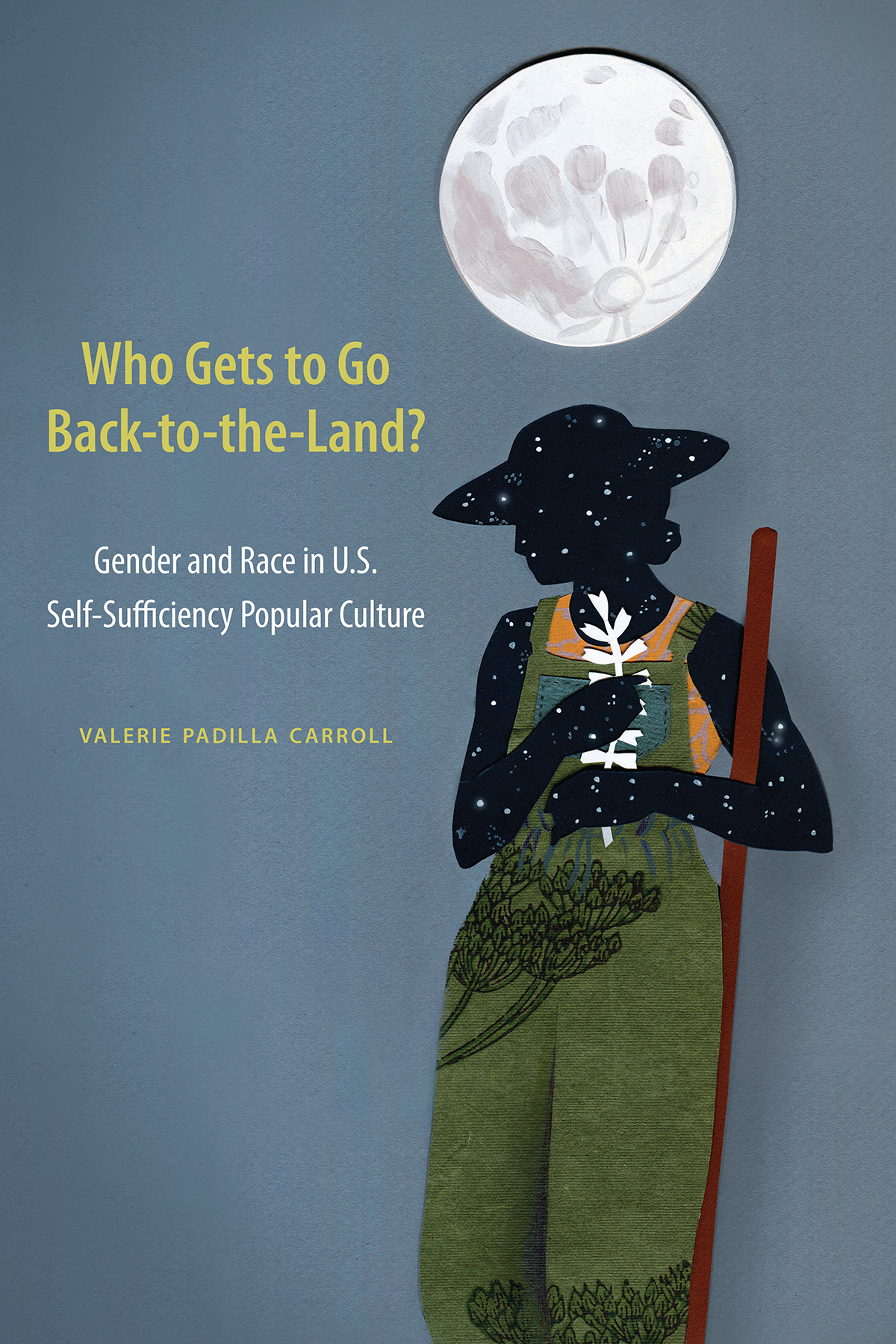
Padilla Carroll makes the past directly relevant to todays context and global issues. Unlike previous scholars she includes people who have been excluded from the narratives, especially Americans of color but also queer Americans, who have created resistant narratives. Padilla Carroll presents a seamless exposition with well-chosen sources for analysis.
Clark A. Pomerleau, author of Califia Women: Feminist Education against Sexism, Classism, and Racism
Padilla Carroll recovers key historical texts and authors from the back-to-the-land movement and shapes the current, contemporary canon by looking at the established print and new publication outlets. Rather than emphasize the emergence of a critical mass within popular culture, the author turns to the margins to recover the nondominant voices of the movement. Padilla Carroll offers sharp, compelling close reading analysis, deftly unpacking the quotations used as examples.
Kristin J. Jacobson, author of The American Adrenaline Narrative
Who Gets to Go Back-to-the-Land?
Gender and Race in U.S. Self-Sufficiency Popular Culture
Valerie Padilla Carroll
University of Nebraska Press | Lincoln
2022 by the Board of Regents of the University of Nebraska
Cover designed by University of Nebraska Press; cover art: In Dreams We Wake Molly Costello.
Acknowledgments for the use of previously published material appear in , which constitutes an extension of the copyright page.
All rights reserved
The University of Nebraska Press is part of a land-grant institution with campuses and programs on the past, present, and future homelands of the Pawnee, Ponca, Otoe-Missouria, Omaha, Dakota, Lakota, Kaw, Cheyenne, and Arapaho Peoples, as well as those of the relocated Ho-Chunk, Sac and Fox, and Iowa Peoples.
Library of Congress Cataloging-in-Publication Data
Names: Padilla Carroll, Valerie, author.
Title: Who gets to go back-to-the-land?: Gender and race in U.S. self-sufficiency popular culture / Valerie Padilla Carroll.
Other titles: Gender and race in United States self-sufficiency popular culture
Description: Lincoln: University of Nebraska Press, [2022] | Includes bibliographical references and index.
Identifiers: LCCN 2022000752
ISBN 9781496215000 (Hardback: acid-free paper)
ISBN 9781496233257 (epub)
ISBN 9781496233264 (pdf)
Subjects: LCSH : Self-reliant livingUnited States. | DiscriminationUnited States. | BISAC : SOCIAL SCIENCE / Gender Studies | SOCIAL SCIENCE / Media Studies
Classification: LCC GF 78 . P 33 2022 | DDC 640dc23/eng20220726
LC record available at https://lccn.loc.gov/2022000752
The publisher does not have any control over and does not assume any responsibility for author or third-party websites or their content.
To the Carrolls and the Padillas, whose different but complementary understandings of the land have defined and enriched my life
Contents
This book is a product of many years and many people from many places. First, I want to thank my family, the Carrolls and the Padillas, for all their love and support. My mom and dad; sisters and brother; in-laws; nieces, nephews, and niblings; granma and grampa; aunts and uncles, both here and passed on; my cousinsso many cousinsyall give my life meaning. A special shout-out to my sister Lisa Carroll Lee for the daily chats and ongoing encouragement; my brother, Carl Carroll, and my sister Alta Carroll for listening to me complain about the writing process; and my sister friend, Jennifer Felux, for listening even when I dont make sense. Thank you all for being my family. A big thank you goes to my aunt Anita Morales, uncle Fred Morales, and cousins Monica Morales Urrabazo and Vivian Morales Phillips. You have influenced my life in profound and wonderful ways. I also want to thank my found family: Lisa Tatonetti, Jennifer Anthony, Tanya Gonzales, and Krista Walton. We met in our early days at K-State and became the superfriends. You keep me on track and grounded, my friends.
I also would like to thank all my other friends and colleagues who helped by reading, commenting on, and discussing my work and being fantastic sounding boards throughout the process. I want to give special thanks to my friend and the worlds best mentor, Elizabeth Dodd, for all her help and encouragement throughout the tenure process and beyond. Thank you also to Jim Machor for helping me think through the organization of my writing. A big thank you goes to my friend Chis Roman, who listened and advised throughout the writing process and beyond. To my friends Michele Janette and Sara Luly, thank you for years of patio drinks and discussions about research, teaching, and life. A special thanks goes to Sara for reading and commenting on the short vignettes that start each chapter of this book. Another big thank you goes to the coffeehouse crew who, in-person pre- COVID and then via Zoom, encouraged me throughout the writing process: Lisa Tatonetti, Anuja Madden, Tom Sarmento, and Abby Knobloch. I want to give special notice and thanks to Lisa, who is not only one of the superfriends and part of the coffee crew (and sometimes the patio happy-hour friends) but also the best research cheerleader ever. Thank you, Lisa, for your amazing comments, editing help, and just general support throughout the years.
I have also greatly benefited from workshopping several of the chapters for this book in the K-State Gender, Women, and Sexuality Studies Department reading group and at the 2019 Placing Gender workshop in Melbourne, Australia. Thank you to all my colleagues in the GWSS reading group and the department: Harlan Weaver, Rachel Levitt, Angela Hubler, Christie Launius, and Susan Rensing. And thank you to all my colleagues at the Melbourne meeting, especially Amy Hay, who also wrote wonderful letters of support for me, and the organizers of the workshop, Katie Holmes and Ruth Morgan, who also provided excellent editing and encouragement for my article in Environment and History, portions of which are included in this book. Finally, I extend my deep appreciation to other colleagues who have gone above and beyond. To my back-to-the-land conference buddy Clark Pomerleau, thank you for the letters of support and your fantastic comments from the beginning. I also want to thank Kristin Jacobson for her careful reading and detailed comments and suggestions on this book, as well as for her letters of support and all her encouragement.
I want to thank Kansas State University for the sabbatical semester that gave me the time to work on this book and for funding the indexing and my archival research through FEP and USRG grants. This archival research took place with the Ralph Borsodi Papers at the University of New Hampshire Librarys Milne Special Collections and Archives and at the Walden Woods Projects Thoreau Institute Library for the Scott and Helen Nearing Papers. Thanks to the Special Collections librarians at New Hampshire for all their help in my research and for access to hard-to-find copies of Myrtle Borsodis writings. Thanks go to Jeff Cramer at the Thoreau Institute as well for all his help navigating their amazing collection.
I also want to extend my deep appreciation to all the people who gave permission for images and interviews. Thanks to the editors of RFD for permission to use Allan Troxlers wonderful parody of a Mother Earth News cover. Thank you to Clear Englebert for the fantastic interview and photo from his early back-to-the-land days. It was a joy to speak with him. (Also I want to give a shout-out to the photographer, Roy Simmons.) Additionally, I am grateful for the fascinating conversation I had with Warren and Nancy Berkowitz of the Good Life Center, which deepened the narrative of my research. I want to thank the people of Soul Fire Farm for all their work and inspiration; Leah Pennimans approval for the use of her book
Next page

